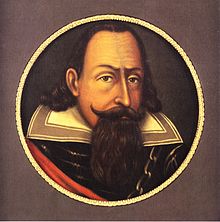Philip II, Duke of Pomerania
| Philip II, Duke of Pomerania | |
|---|---|

Duke Philip II of Pomerania-Stettin
|
|
| Spouse(s) | Sophia of Schleswig-Holstein-Sonderburg |
| Noble family | House of Griffins |
| Father | Bogislaw XIII, Duke of Pomerania |
| Mother | Clara of Brunswick |
| Born |
29 July 1573 Franzburg |
| Died | 3 February 1618 (aged 44) |
Philip II, Duke of Pomerania (29 July 1573 – 3 February 1618) was from 1606 to 1618 the reigning duke of Pomerania-Stettin and is considered among the one of the most artistic of the Pomeranian dukes. He married Sophia of Schleswig-Holstein-Sonderburg in 1607. The marriage remained childless.
Philipp was born on 29 July 1573 in Neuenkamp, which later became Franzburg in Pomerania, as the eldest son of Duke Bogislaw XIII of Pomerania-Barth and his first wife, Clara of Brunswick. He grew up in his father's small residence in Barth. Although he was the second-born son of Duke Philip I of Pomerania-Wolgast, when Philip I's inheritance was divided among the Pomeranian dukes on 1569, waived his rights to a share, in favour of his younger brother Ernest Louis. He had been compensation with an apanage consisting of the district of Barth and the secularized Cistercian monastery at Neuenkamp.
As a child and teenager, Philip received the usual education for a son of a German prince during the late Renaissance era. Soon, however, his artistic and scientific interests grew soon beyond the usual level. Even at the age of twelve, he owned a collection of books and pictures. He wrote his first scientific papers at the age of 17. His art was not just an expression of his royal representation, but emerged from an inner need. At age 18, he wrote: It is may pleasure to collect good, selectd books, portraits from a master's hand, and ancient coins of all kinds. From these I learn how to improve myself and also how I can be beneficial to the general public.
According to the customs of his time he undertook numerous grand tours, which led him to many European countries and the local courts. The two-year stay in Italy at the end of his final grand tour, was cut short in 1598 when his mother fell seriously ill.
...
Wikipedia
